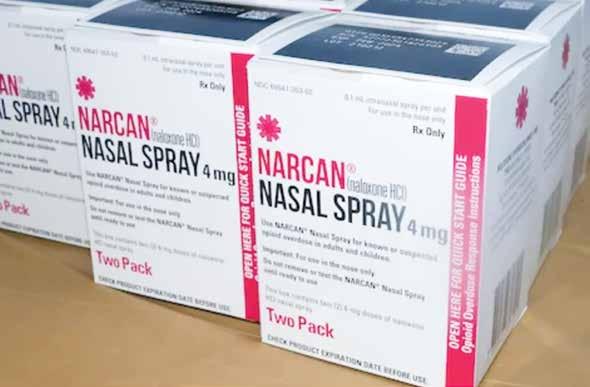
3 minute read
Health
OVERDOSE PREVENTION STRATEGY ANNIVERSARY
Health Agencies Encourage Solutions For National Overdose Crisis
Lindiwe Vilakazi WI Staff Writer
While overdose totals have shown a slight decrease over recent years, the landscape of the drug market has taken a daunting turn with the outpour of fentanyl on city streets, encouraging national health officials to push for approval of over the counter overdose medications in hopes to save more lives.
The Department of Health and Human Services (HHS) in conjunction with Whitman Walker medical center, held a recent press conference in honor of the agency’s “Overdose Prevention Strategy,” anniversary, celebrating national efforts to fight drug addiction and sharing goals for the future.
Chief Medical Correspondent Dr. Sanjay Gupta, spoke of the urgency to provide overdose reversing medications in the areas most disproportionately affected.
“The important piece that we need to understand [is] we are the most dynamic drug supply environment this nation and the world has ever faced, to the tune that we are losing an American every five minutes around the clock. This is largely preventable” said Dr. Gupta.
The Chief Medical Correspondent said HHS is working to increase access to naloxone, or its brand name Narcan, which serves as an antidote when people are overdosing from opioids, and can be integral in combating fatalities.
“It’s critically important and I’m so glad that from President Biden on down, we are all committed to ensuring this is a priority for the nation to save people’s lives first and to help them get into treatment.”
Between March 2021 to March 2022, overdose rates reached roughly 100,000 lost lives across the country, as local opioid overdose rates have surpassed homicide rates for the year. Still today, barriers continue to exist in the height of the opioid epidemic as health agencies spot the desperate need of easy-reaching access to naloxone and narcan treatments for daily overdoses, similar to the easy availability of defibrillators for smoke alarms.
The FDA has recently put in a federal register notice to produce naloxone for over-the-counter availability. This register makes clear the requested processes needed to take place, while opening applications for companies who can mass produce the overdose reversing medication, and widely distribute.
Research and evidence-informed tools are providing better solutions to the crisis.
“At the end of the day, each one of our loved ones deserves the chance to survive, and strive,” HHS Secretary, Dr. Becerra concluded during the press conference.
WI
5 The Department of Health and Human Services held a press conference celebrating the anniversary of the “Overdose Prevention Strategy,” and shared strategies such as increasing access to Narcan. (WI File Photo/Shevry Lassiter)
Examining The Challenge of Food Allergies In Local Communities

5 Research supports a clear intersectionality between poor clinical food allergy related outcomes and socio-demographic variables within the Black community. (Courtesy Photo)
Lindiwe Vilakazi WI Staff Writer
When examining some of the most prominent illnesses commonly seen across Black communities, food allergies tend to go overlooked when considering signifiers of greater health issues. While it is not confirmed whether Black people suffer food allergy related ailments due to genetic makeup, research supports a clear intersectionality that exists between poor clinical outcomes and socio-demographic variables within Black communities.
According to the National Library of Medicine National Center for Biotechnology Information (NIH), there is a “higher risk of self-reported food allergy amongst ethnic minority groups in the USA.” The report added that there are “higher rates of single and multiple food allergies amongst Black American children vs. other ethnic minority groups.”
Both children and adults in the Black community are seemingly struck with greater risk of food allergy illnesses. The report indicates that there is a clear correlation between food allergies and “health literacy.”
“Evidence suggests a strong intersection between poor clinical outcomes and deprivation and literacy, as a significant proportion of the ‘most deprived population’, and those with poor general and health literacy are likely to be from ethnic minority groups,” NIH reports. “This is highly relevant in patients with allergies and allergic conditions as clinical
FOOD Page 52










